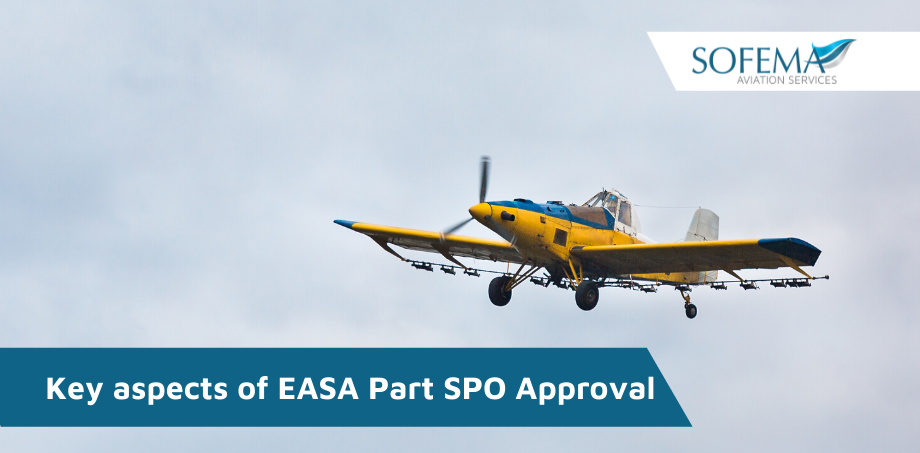Sofema Aviation Services (SAS) www.sassofia.com reviews key aspects of EASA Part SPO Approval.
Introduction – What is Part SPO?
Specialised operations (SPO) means the activities of the organisation of activities other than commercial air transport where the aircraft is used for specialised activities such as:
- agriculture
- construction
- photography
- surveying
- observation and patrol
- aerial advertisement
In 2014 Regulation 379/2014 introduced Part SPO activities into Commission Regulation (EU) No 965/2012 on Air Operations. Regulation (EU) No 379/2014 applies from 1 July 2014 an opt-out was in place until 21 April 2017.
Commercial and non-commercial SPO with complex aeroplanes and helicopters may be conducted as soon as the SPO operator submits a declaration to its competent authority.
Non-commercial specialised operations with other than complex motor-powered aircraft do not submit declarations.
Note – None of those operations is subject to an Air Operator Certificate.
Part SPO Applicability & Requirements:
- Operators who have their principal place of business (for companies) or reside (for natural persons) in an EU MS regardless of the State of Registry of their aircraft; and
Aircraft used in commercial SPO operations must have a C of A in accordance with Regulation (EU) No 748/2012, meaning the aircraft must be registered in an EU Member State. - Alternatively, the aircraft may be under a wet lease-in or a dry lease-in agreement.
o In those cases, the aircraft may remain in a third country register.
o There are however certain conditions that have to be met before the operator may lease in third country registered aircraft.
o There is no requirement for aircraft registration in non-commercial SPO operations.
Concerning Excluded Aircraft
Operators/operations/aircraft that do not fall under Regulation (EU) No 965/2012, but are regulated in accordance with Member States national legislation:
- Specialised commercial and non-commercial operations of aircraft falling under Annex I to Regulation (EU) 2018/1139 (the Basic Regulation);
- Military, customs, police, search and rescue, firefighting, coastguard or similar activities or services;
- Third-country operators of SPO commercial and non-commercial.
Operations that Fall Under Part-SPO
- SPO non-commercial using complex aeroplanes and helicopters;
- All commercial SPO with aeroplanes and helicopters.
Concerning Operations and aircraft that do not fall under Part-SPO, but fall under Part-NCO
- Non-commercial SPO of non-complex aeroplanes and helicopters;
- Certain commercial SPO of non-complex aeroplanes and helicopters in accordance with SPO.GEN.005(c) such as:
o Competition flights or flying displays, on the condition that the remuneration or any valuable consideration given for such flights is limited to recovery of direct costs and a proportionate contribution to annual costs, as well as prizes of no more than a value specified by the competent authority;
o Parachute dropping, sailplane towing or aerobatic flights performed either by a training organisation having its principal place of business in a Member State and approved in accordance with Regulation (EU) No 1178/2011, or
o By an organisation created with the aim of promoting aerial sport or leisure aviation, on the condition that the aircraft is operated by the organisation on the basis of ownership or dry lease, that the flight does not generate profits distributed outside of the organisation, and that whenever non-members of the organisation are involved, such flights represent only a marginal activity of the organisation.
Note – Part-SPO includes the implementing rules (IRs) for commercial specialised air operations with complex and non-complex aeroplanes and helicopters and for non-commercial specialised air operations with complex aeroplanes and helicopters.
- Specialised operations with balloons – both commercial and non-commercial – are governed by Reg. (EU) 2018/395 laying down detailed rules for the operation of balloons.
- Specialised operations with sailplanes – both commercial and non-commercial – are governed by Reg. (EU) 2018/1976 laying down detailed rules for the operation of sailplanes.
Some commercial SPO of high risk, especially for third parties on the ground, would need to be authorised by the competent authority. An operator who engages in such a high risk commercial SPO must therefore apply for an authorisation, in addition to the declaration it has submitted.
What Are High Risk Operations?
“High risk commercial specialised operation” means:
- Any commercial specialised aircraft operation carried out over an area where the safety of third parties on the ground is likely to be endangered in the event of an emergency, or as determined by the competent authority of the place where the operation is conducted, any commercial specialised aircraft operation that, due to its specific nature and the local environment in which it is conducted, poses a high risk, in particular to third parties on the ground.
Next Steps
Follow this link to our Library to find & Download related documents for Free.
Sofema Aviation Services (SAS) & Sofema Online (SOL) provide Classroom, Webinar, and Online Training Courses. For additional details visit our websites www.sassofia.com and www.sofemaonline.com or email team@sassofia.com
Tags:
Air Operator Certificate, Aircraft, aviation, Basic Regulation (EU) 2018/1139, Commission Regulation (EU) No 965/2012, EASA, EASA Part SPO, High Risk Operations, Part NCO, Part SPO, Regulation (EU) No 1178/2011, Regulation (EU) No 748/2012, Regulation (EU) No 965/2012, Regulation 379/2014, SAS blogs, Specialised operations




